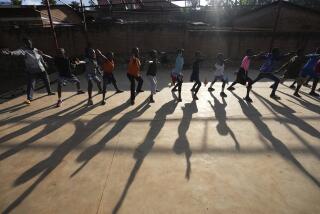Rwandan Massacre
- Share via
In response to Constance Hilliard (Commentary, Feb. 9), who tells us that we should feel connected through shared history to the Rwandan massacres, I say that the blood bath that occurred there is a human aberration.
You don’t systematically butcher 1 million people (mostly neighbors killing neighbors) within the space of a year and call it normal. Even today, when the killers are beginning to be prosecuted for what they did, Time magazine reports that officials are only going after those who killed 50 or more. They do not have the manpower to investigate everyone who killed.
Despite Hilliard’s odd attempt at sharing the blame by saying America has been “Rwandaized” by the militia movement, Oklahoma City bombing and black church fires, I feel no connectedness to the killers in Rwanda. The incidents she mentions spring from the extreme fringe of American society, not vast numbers of citizens.
Hilliard points to the brutality of 17th-century Europeans in land distribution, and notes the mass refugee movement that followed. She didn’t have to go back that far. The recent ethnic war in Bosnia shows that neighbor can turn against neighbor, killing only because of one’s background. However, none of this historical analogy excuses the vicious, inhuman rampage in Rwanda.
Why didn’t the West aggressively report this story? Because the people dying were black, poor and far away. More concern was expressed by the American liberal media for the fate of the Rwandan gorillas during this conflict than the fate of so many people who died.
LAURA BROWN
San Gabriel
More to Read
Sign up for Essential California
The most important California stories and recommendations in your inbox every morning.
You may occasionally receive promotional content from the Los Angeles Times.













